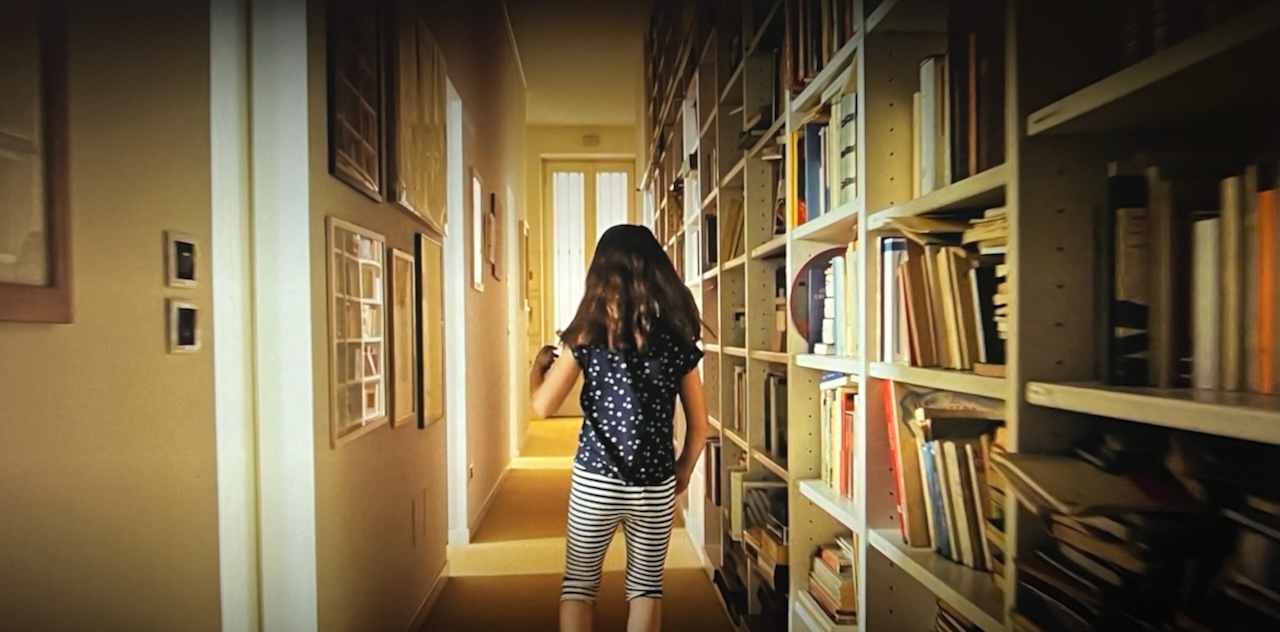
From Umberto Eco: A Library of the World, (The Cinema Guild)
The 2022 documentary Umberto Eco: A Library of the World is more than a tour of the writer’s personal library of more than 30,000 books (Eco had lost count), which once got him evicted from a residence because the city engineer was afraid it would collapse the building.
“This library has a smell like perfume,” his daughter says, “and a sound, too. When you walk those corridors full of books, everything becomes muffled. And I feel very protected there.”
His son says the library has sections of course—fiction in several languages, comics, occult topics, illustrated manuscripts—but the books shifted among subcategories, and often only his father knew where things were.
“It’s a living thing, not an archive,” he says.
It must have been painful then, after Eco died in 2016, when his family gave his library (the collection shown and presumably a second one of nearly equal size in his other home) to the Italian state. The documentary lets Eco eternally stalk his prey of a desired volume in his beautifully utilitarian library.
But most of the film exists to let him continue to express a fierce belief in print culture. In a speech he is shown saying that papyrus has lasted thousands of years, books 500 years, but we do not know how long electronic media will last, and that in fact old floppy disks often cannot be read. Worse, he says, is the glut of material on the web.
“This world is overloaded with messages,” he says. “And each of them says nothing.”
He compares Borges’ character Ireneo Funes, a boy who sees and remembers everything, to the internet but says he is an “idiot” because “he can’t handle it”: “[I]f we knew all that’s contained on the web, we’d go crazy.”
Memory, Eco says, is meant to remember and select. Our culture should “decimate daily events, discarding what’s useless or too complicated to remember.” The internet “is without tools to filter its content…[presenting] a new challenge for mankind.” (It does have tools, but they are increasingly corporate-driven, showing us what the marketers want us to see, and this year AI has exploded and will likely flood the ecosystem with rehashed and machine-generated memories.)
Shared, common knowledge and its communication are necessary to keep things running, Eco says, but six billion people looking online at the same facts could come to six billion different conclusions. A click can produce a bibliography of 10,000 books, which he deems useless. In the old days, he says, sounding terribly conservative for a leftist, you went to a library, got three books on the topic, and learned something.
“So, you see, the moment we think we own a limitless memory, we have lost it. […] Too many things together produce noise, and noise is not a tool of knowledge. […] Perhaps we are entering an era when real education will not mean to supply information but teaching to be selective with it.”
Reading, he says—and he still mostly means books—is a way of being curious about the world. He says that he is often asked if people don’t read enough and explains that Italy had a high rate of illiteracy until 1950, so more people read now. But there are always those who do not want to read, because they are not “intellectually curious.”
“To be curious intellectually means to be alive. But believe me, there aren’t many people alive in this world,” Eco says.
At the end of the documentary, a girl (his granddaughter?) roller-skates through his library, and Eco speaks of the Book of Kings, in which there are various cataclysms but the Lord is not in them; he is in the silence after them.
“You cannot find God where there is noise,” Eco says. “God reveals himself only in silence. God is not to be found in mass media, nor on newspapers’ front pages; God is never on TV. God is where there is no commotion. And this is also true for those who do not believe in God but think that somewhere there’s a truth to unveil or a value to create. There’s no truth or creativity in an earthquake, only in a silent search.”
This was the secret of the library for Umberto Eco.
